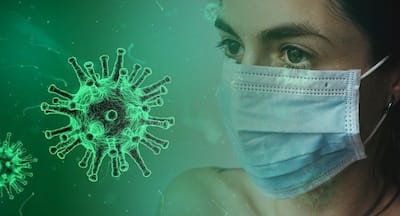Don’t Miss Out on the Latest Updates.
Subscribe to Our Newsletter Today!
Anti-bacterial graphene face masks that can deactivate coronaviruses developed

Scientists have developed a graphene mask that can deactivate two coronaviruses and kill bacteria more effectively. Read on to know more.
To fight against the COVID-19 pandemic, scientists have successfully produced graphene masks with an anti-bacterial efficiency of 80 per cent, which can be enhanced to almost 100 per cent with exposure to sunlight for around 10 minutes. According to the study from the City University of Hong Kong (CityU), initial tests also showed very promising results in the deactivation of two species of coronaviruses. This was published in the journal ACS Nano. According to researchers, the graphene masks are easily produced at low cost and can help to resolve the problems of sourcing raw materials and disposing of non-biodegradable masks. The researchers revealed that commonly used surgical masks are not anti-bacterial. This may lead to the risk of secondary transmission of bacterial infection when people touch the contaminated surfaces of the used masks or discard them improperly.
Graphene masks better than of masks with activated carbon fibre and melt-blown fabrics
Graphene is known for its anti-bacterial properties. So, as early as last September, much before the outbreak of COVID-19, producing outperforming masks with laser-induced graphene came to the mind of lead author of this study, Dr Ye Ruquan. For the findings, the research team tested their laser-induced graphene with E. coli, and it achieved high anti-bacterial efficiency of about 82 per cent. In comparison, the anti-bacterial efficiency of activated carbon fibre and melt-blown fabrics, both commonly-used materials in masks, were only 2 per cent and 9 per cent respectively.
Hydrophobic property of graphene kills bacterial cell membrane
Experiment results also showed that over 90 per cent of the E. coli deposited on them remained alive even after 8 hours, while most of the E. coli deposited on the graphene surface were dead after eight hours. Moreover, the laser-induced graphene showed a superior anti-bacterial capacity for aerosolised bacteria. Researchers agree that more research on the exact mechanism of graphene's bacteria-killing property is needed. But they believe it might be related to the damage of bacterial cell membranes by graphene's sharp edge. And the bacteria may be killed by dehydration induced by the hydrophobic (water-repelling) property of graphene.
Also Read
Just 10 minutes of sunlight increased effectiveness of masks by 99 per cent
Previous studies suggested that COVID-19 would lose its infectivity at high temperatures. So, the team carried out experiments to test if the graphene's photothermal effect (producing heat after absorbing light) can enhance the anti-bacterial effect. The results showed that the anti-bacterial efficiency of the graphene material could be improved to 99.998 per cent within 10 minutes under sunlight, while activated carbon fibre and melt-blown fabrics only showed an efficiency of 67 per cent and 85 per cent respectively.
Trials on to bring masks to the market at the earliest
The team is currently working with laboratories in mainland China to test the graphene material with two species of human coronaviruses. Their next step is to further enhance the anti-virus efficiency and develop a reusable strategy for the face mask. They hope to release it to the market shortly after designing an optimal structure for the mask and obtaining the certifications.
(With inputs from IANS)


